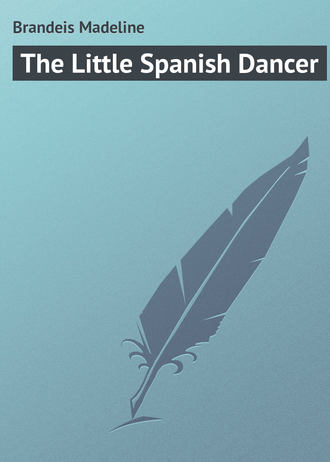 полная версия
полная версияThe Little Spanish Dancer
Where does she live? I should like to have her as my pupil."
But nobody in Triana knew where Pilar lived, and, of course, her name is a common one in Spain.
On the way home, Pilar's spirits began to fall. She began to think of having to part with her precious castanets. How she wished that there might be some other way of – !
Suddenly she remembered Tony – Tony, the boy who had played bullfight with Juan years ago. It was weeks now since Juan had sent the old red cape to America and had written to Tony.
Juan had said that Tony was rich and generous and that he would help Pilar and her grandfather because he would remember Pilar's mother. But Pilar had begun to wonder whether Tony really would.
When she reached home, all the excitement of the fiesta had worn away. She was very unhappy. Tomorrow she must give up the castanets. Juan had said that he could sell them to a dancing master, who paid handsomely for antiques.
Pilar started to undress. She unpinned the brooch that fastened her costume at the throat. And all at once, her face lit up with a wonderful new idea.
She would take this brooch to Juan tomorrow. It was her own, part of her dancing costume. But she would far rather part with it than with her mother's castanets.
The brooch was a small painting called a miniature. It was the likeness of young Prince Alfonso, the brother of Queen Isabella of Spain.
Pilar hurried off to bed. And while she sleeps, let us listen to the "Mystery of the Young Prince."
CHAPTER IX
THE MYSTERY OF THE YOUNG PRINCE
Alfonso was only a boy. But some day he would be king, for he was next in line to his brother, King Henry. After him came his sister, Isabella, a beautiful little girl, earnest and thoughtful.
Alfonso felt himself to be Isabella's knight and protector. He had learned to ride and to use his sword like a true Spanish cavalier.
One day at twilight Isabella sat at the window, embroidering a Moorish design upon a bit of gold cloth. Alfonso, his studies over for the day, was reading to her.
Better than anything else, the Prince loved to read – which may have been the reason for what happened later – at least, for what is supposed to have happened. For nobody rightly knows the truth of the bitter story.
As the two children sat together, enjoying the happiest moment of their day, one of the King's spies secretly watched and listened.
He heard the Princess Isabella say, "Enough of that for now, Alfonso. Come. Read my favorite book."
Alfonso put down the book which he had been reading, and the spy noted well its title, "The Odyssey (ŏd´ĭ-sĭ)." He also had noted something else. Always before the Prince turned a page, he first moistened his finger with his tongue.
Squinting his eyes, the spy smiled wickedly to himself and stole away.
Several nights later, this same spy crept into the Prince's chamber and, feeling cautiously about, he at last found what he sought. It was a book, "The Odyssey."
Working with agile fingers, he opened the book, and upon each page he smeared a deadly poison. Then he returned the book to its place and left the room as quietly as he had entered.
Now trouble and discontent filled the country. Some of the people were not pleased with King Henry, and they wanted to place young Alfonso upon the throne.
The Prince and his sister began to live through turbulent times, and their peaceful hours together were over. Alfonso was thrown into prison, then suddenly freed again, to become an important figure in the kingdom.
He was told that soon he would be crowned king, for the rebels were going to overthrow his brother Henry. Whispered plans, secret schemes stirred in the air like poisonous insects. And the poisoned book lay where the spy had left it. The Prince found little time for reading.
But today he had managed to meet his sister, and the two were very happy to be together again for an hour of quiet reading.
Alfonso picked up the book, "The Odyssey," but Isabella said, "No, not that one, Alfonso. Today let us hear this most interesting novel. It tells why the wind blows, why we smell and taste and hear, all in the form of a story."
She smiled and handed him the other book. Good-naturedly Alfonso put down "The Odyssey." Had he but known it, he put from him death!
Soon afterwards, the prince was again torn from his sister, this time to live through one of the most dramatic events in his stormy young life.
One day a splendid procession made its way into the town of Avila. Among the cavaliers rode Prince Alfonso. His horse richly decked, he sat stiffly upon the saddle, clothed in armor. His boyish face was grave and stern.
As he passed, the people cried out, "Long live King Alfonso!"
A throne had been erected out upon the plains. On this throne sat what appeared to be a king. He held a scepter, and the crown upon his head gleamed brightly in the sun.
But as the cavalcade drew closer, it was seen that the figure had fallen over on its side like a sawdust doll. And indeed, that is just what it was – a scarecrow, made to represent King Henry.
The Prince and his followers stood upon the platform. A colorful crowd had gathered about them – monks in brown, monks in white and black, lords in bright-hued mantles, Moors with turbans on their heads, peasants, beggars, young and old.
Bugles rang out, and drums rolled. The little Prince stood, proudly royal, in his armor. His blond hair showed under the visor which had been pushed back from his head.
Then the Archbishop snatched the crown from the head of the scarecrow king and roared, "Thus lose the royal dignity which you have guarded ill."
And one of the cavaliers roughly kicked the figure off its throne. There were cries and shouts and some gasps of horror. Alfonso was seated upon the throne and crowned King of Avila.
Petty wars, robberies, and murders followed. Part of the country was in favor of King Henry, while the rebels supported Alfonso. A terrible battle took place in Toledo. Houses were burned and people massacred.
A few days later, Alfonso arrived in the town.
Those who had burned and massacred bowed down to the young king, saying, "We will fight for your cause if you will approve this massacre."
Alfonso replied, "God forbid that I should approve such horrors!"
The next thing he knew, Alfonso's country was plunged into war. The rebels were to meet the King's men in conflict.
The night before the battle Alfonso, rest-less and unhappy, paced his chamber. Why must men fight? Why must they kill one another? The Prince loved power; but better than power, he loved peace.
Wherever he went, he always took along some of his books. Now upon the table lay several, and among them was "The Odyssey." Alfonso laid his hand upon his favorite work and was about to take it up when he let it fall again.
No, he could not read tonight. His heart was too heavy. He missed his sister and, too, he kept thinking of their future – a stormy prospect. For Isabella no doubt would be forced to marry some distasteful noble. And he? With enemies upon all sides, if he were not killed in war, he might well be murdered in his sleep.
Next day in full armor, his sword drawn, the boy King of Avila went out to meet his foe. Fighting bravely, by his soldiers, it is said that he was last to leave the battle.
There came a time when Alfonso set forth upon a journey, accompanied by a group of nobles. Among his traveling companions were several of the King's followers, one of them that same spy who had smeared poison upon the leaves of Alfonso's book.
As evening overtook the party of travelers, they drew rein in the town of Cardenosa, and planned to stop there for the night.
As usual, Alfonso had brought along his books. But too often had his enemies been disappointed, so now they planned a trick. It was a trick which would force the Prince into their cruel trap.
They removed all but one of Alfonso's books from his chamber. The one left was placed in plain view upon the table. It was "The Odyssey."
Wondering what had become of the others, but too weary to find out, the Prince settled himself to read before retiring for the night. As he opened the book he smiled, remembering Isabella and how she had always urged him to read something else.
Well, tonight he might do as he pleased, for he was quite alone. Tonight he might read "The Odyssey," which he had not opened for so long.
Page after page he turned with a finger moistened by his tongue. And an hour passed.
Late during the night, a messenger rode madly into the town of Segovia where the Princess Isabella was living.
"The King of Avila is dying!" the messenger gasped. "He calls for his sister, the Princess Isabella!"
Isabella rode furiously through the night and when she reached Cardenosa, she was met by the Archbishop of Toledo. He held out his hand to her, and in his face there was pity and grief. Before he even told her, Isabella knew that her beloved brother was dead.
Some claimed that enemies had given him poisoned fish. Others believed that he had died of a fever. Still others told the story which you have just heard. But whether or not it is true will remain a mystery forever.
There is a wonderful cathedral in Burgos, whose Gothic spires point upward like lace fingers. They point to a hill above the city, upon which rests the Miraflores Chapel.
Inside this chapel is a beautiful statue of a boy. He wears a royal mantle and kneels before a praying desk. The boy is Alfonso.
When Henry died, it was the earnest little Isabella who became queen. Today in the Cathedral of Granada – that white and gold and silver cathedral – are the tombs of Queen Isabella and her husband, King Ferdinand.
They are carved of marble, and Isabella's pillow sinks down deeper than Ferdinand's with the weight of her head. They say that this is because her head held more brains than his.
We know she was a wise, good queen and we love her because she helped Christopher Columbus and listened to his dreams.
But just suppose Alfonso had not died. Suppose, instead, that he had lived and ruled. Do you believe Alfonso would have listened to Columbus' dreams and understood as did his sister Isabella? And, had he not, where should we be today?
CHAPTER X
A STOUT SWEETHEART
The sale of the Prince Alfonso brooch brought Pilar and her grandfather enough to live on for a week. Then once more Pilar was faced with having to give up the castanets.
Juan seemed eager to have them now. He said that the great dancing master had shown much interest in them.
This dancing master was the same one who had inquired about Pilar at the fiesta that night in Triana, though Juan, of course, did not know it.
At last the fatal day arrived when Pilar could no longer delay her visit to Juan's shop. What she would do after this last sale she had no idea. Unless her grandfather's health improved so that he might work again, things looked black for both of them.
Pilar went out onto the balcony of her house. Girl-draped balconies are as natural in Spain as donkey-dotted roads and child-filled doorways.
Pilar gazed down on the street. The morning was golden. Church bells clanged, and a knife grinder was piping on an Arab reed. A broom-maker squatted on the pavement across the way.
Pilar's eyes were full of tears as she took up the castanets and went with them into her grandfather's room.
"I am going out, Grandfather," she said.
But she mentioned nothing about selling the castanets. She could not trust herself to speak. However, her grandfather saw them in her hands, and his old eyes brightened.
"Some day I shall tell you – stories – about – those – " he breathed. "Your mother – loved – them – "
"Do not talk now, Grandfather. It will tire you," said Pilar.
She wanted to be off, to have it all over with as quickly as possible. She knew that if her grandfather told her a story about the castanets, it would be even harder to part with them. Poor Pilar! If she had listened to just one of those legends, she would not have dared to sell the wooden clappers.
"Good-bye, dear Grandfather."
She kissed him and left.
As she opened the gate that led out of the small court of their house, she ran into a stout, grinning boy.
"Oh, Pepe!" cried Pilar. "When did you get back?"
All summer Pepe had been away on a journey. Now here he was home again to follow and annoy Pilar.
Pepe liked to make believe that he was a cavalier. He liked to imitate his older brothers. For in Spain a man courts his lady in a very romantic way. He stands outside her window at night, and sometimes he sings love songs to her.
This funny, stout little Pepe often met Pilar at school and walked home with her. Once he had even tried to sing under her window. But a neighbor thought it was a tomcat howling and threw a bucket of water on his head.
Today Pilar was in no mood to be followed about. Today was a bitter day in her life. For this time there was no more hope of keeping the castanets. She knew that at last she must really give them up to Juan.
She started to walk on ahead of Pepe. But he followed her.
He puffed as he jogged along behind her, calling out, "Wait for me, Pilar. I have much to tell you. I have been to far-away places. Ho! Listen, Pilar. I have been to Algeciras (ăl´jē̍-sē´rȧs) and to the Rock of Gibraltar."
Pilar thought Pepe himself looked like the Rock of Gibraltar. She had seen pictures of the great, solid rock. It belongs to England, and just across Gibraltar Bay is the lazy little Spanish seaport town of Algeciras.
Pilar usually liked to listen to Pepe's tales of his travels. The boy's father often took him away to places where they saw interesting and curious sights.
But today it was impossible to pay attention. She tried to get away from Pepe and walked faster and faster.
He followed doggedly, breaking into a gallop and crying out in little gasps, "Hi! But listen, Pilar."
And so eager was he to reach her that he did not notice where he was going, and all of a sudden – pff! bang! He had crashed into a man wearing what looked like a ballet skirt of tin cans. They were milk cans.
They shot in all directions. The man began to scold Pepe and to wave his arms about. A crowd gathered, and in the noise and excitement, Pilar escaped from her stout little sweetheart.
Seville's great cathedral was just across the street – a massive giant, squatting in the sun. Pilar went inside. It was cool and peaceful there. Works of art filled the vast church – paintings, fine carvings, and the stately tomb of Christopher Columbus.
Pilar knelt before the altar, where a curious ceremony takes place every year. This ceremony is called "The Dance of the Six Boys."
Pilar prayed, her eyes closed, her lips moving. And clasped to her heart were the castanets – the magic castanets, about which another legend was woven – a legend around this very Dance of the Six.
CHAPTER XI
DANCE OF THE SIX
(A Legend of the Castanets)The chorus had been sung, and now they were dancing to the steady, clicking rhythm of their castanets. It was a dignified dance, done by young boys wearing silken pages' costumes and wide, plumed hats.
Everybody felt the solemn beauty of the ceremony, and a hushed reverence had fallen over the cathedral. Two old people, a woman with a black shawl thrown over her head and an old man with a tanned, leathery face, sat silently weeping.
Fernando, their son, moved among those graceful figures beneath the altar. He was a part of the royal Dance of the Six, called the Sevillana.
How proud were these old people of their son Fernando! How happy to know that, each year, he would take his place in this age-old ceremony of their forefathers, in the dance which had been performed for centuries in Seville's cathedral!
For in the far distant past, the Pope, hearing about the Sevillana, wished to see for himself what sort of dance it was. In those days, it would have been considered shocking for girls to dance before the Pope. So six boys were taught the steps of the Sevillana and taken to the Vatican in Rome.
Here they danced, dressed in their beautiful silken costumes. The Pope was so well pleased that he granted permission to use this dance during certain ceremonies at the cathedral. But the privilege was to last only so long as the boys' costumes lasted.
Today these costumes are still in use. But what a deal of patching and mending must have taken place during those hundreds of years!
When the dance was over, Fernando went into his room and pulled off his quaint, plumed hat. The reverent little dancer had changed to a furious, red-faced youth. He threw the hat down on the floor in a fit of anger.
"Never!" he cried. "Never will I dance it again!"
His sister Maria stood trembling at the door.
"Do not say that, Fernando," she begged. "Think of our parents. You would break their hearts were you never to dance in the cathedral again. These past three days have been for them the happiest of their lives."
"I shall never dance again," repeated Fernando firmly. "It is girls' work, and I am a boy. I shall run away and work with men – and be a man!"
Fernando picked up his castanets, which had fallen to the floor.
"Miguel will take my place in the chorus," he said. "I shall have no more use for these castanets, and so I shall give them – "
"No! No!" cried Fernando's sister. She ran over to him and caught him by the arm. "You must never give away those castanets. Surely you have heard about their magic power and the legends attached to them. Ill luck to him who loses or gives away – "
"Nonsense!" scoffed Fernando. "I do not believe such tales. They are old women's twaddle!"
"Perhaps," agreed his sister. "Yet remember what our grandmother once told us. She said that the castanets have always been a power for good. And whenever we do things which we should not do, they bring misfortune to us and to our family."
Then she recited:
"Castanets, with magic spell,Never lose or give or sell;If you do, then grief and strifeWill follow you through all your life.""Yes, I know," said Fernando shortly. "But," and he grinned, "I shall change that verse to:
'Castanets, you have no spell;If I lose or give or sell,I shall live in manly strife,Not be a sissy all my life!'"One night many years later, this same Fernando, now a man, glided along in a boat on a river near the border of France. With him were several other men, and all of them were smugglers.
Fernando had long lived in the Pyrenees (pĭr´ē̍-nēz) Mountains. He had joined a band of people who secretly smuggled forbidden goods from Spain to France in the dead of night. They led a dangerous life and were always in fear of the customs men.
As their boat now moved gently along the water, Fernando's companions slept. All night they had labored, and they were weary. But Fernando could not sleep. Somehow his thoughts kept taking him to Seville, to his parents and his sister Maria. What had become of them?
In all these years he had heard no word from them, and until now, he had barely given them a thought. But tonight – How strange that they should creep into his mind!
A shot rang out hideously. The customs men were after them! Another shot! And another and another! One by one, the smugglers in the little boat crumpled where they sat. Then the small craft itself began to sink – down, down.
All was silent upon the surface of the water. All was silent for a long time, and then Fernando, holding to a floating board, slowly raised his head.
The morning had begun to dawn over the Spanish Pyrenees. A hoarse church bell rang out. Fernando looked about him. The customs men had gone back to France. The smugglers, too, had gone, but not to France; to the bottom of the river.
Fernando swam to shore, and the next day he set off for Seville. He had one aim: to find his family and to try to make up for the heartache he had caused them.
But Fernando was never to see his parents again. Long since the old people had died, and only his sister Maria remained. He found her living in a poor and squalid alley. Yet when he walked into her shabby room, she did not seem in the least surprised to see him.
"I knew that you would come back, Fernando," she said quietly. "I expected you."
Puzzled, he started to speak, but she silenced him.
Then thrusting her hand inside her blouse, she drew out the magic castanets, saying, "They were brought back to me, Fernando!"
Fernando stood fixed to the spot, his eyes upon the old clappers, which he had given away so many years ago in a fit of boyish rage. Then a sudden curious idea occurred to him.
"When were they returned to you?" he asked Maria.
She told him, and he knew then that it had been upon the very same night when his life had been spared, out there upon those dangerous waters – the very same night when he had been thinking so earnestly of his family.
His sister listened while he told her of his many adventures as a smuggler. He promised to give it all up, to help her, and to become an honest man.
"For," he ended, laughing, "there is an old Basque saying, 'If a smuggler is an honest man, then legends are the truth.'"
"But surely, Fernando," said his sister, "you must believe in the legends of the castanets after what has happened to us."
Fernando shook his head.
"I believe only in the power for good," he replied.
Some years later, Fernando had a little son of his own who danced in the cathedral of Seville. And do you see those two old people who sit there watching, solemn-eyed and happy?
They are Fernando and his wife, and they are very proud that their boy is taking his place in this age-old ceremony of their forefathers.
CHAPTER XII
PILAR'S GRANDFATHER REMEMBERS
After Pilar went out, her grandfather lay thinking. Somehow the old man felt better today. He did not fall asleep as soon as Pilar left the house.
He began to wonder where she had gone and why she had taken the castanets with her. He knew that she had been obliged to sell many of her mother's souvenirs, so that they might live. But he hoped that soon he would be able again to provide for his granddaughter and himself.
"Suppose Pilly has gone out to sell the castanets," he thought.
The idea frightened him. Yet he tried to tell himself that he was just a foolish old man, to believe in a fairy tale about the charm of a pair of castanets.
Still he could not help remembering the legends which had been handed down through his family.
He lay dreaming, and before him passed the days when Pilar's mother had been young. Her name had been Carmen Pilar Innocentia Gonzales, but she had been known as "Carmen, the Little Spanish Dancer."
As a little girl, she had been just such a graceful dancer as Pilar. And one day a great teacher from Madrid had seen her and had taken her away to study in the capital.
But before that, she had spent much time on the streets of Seville. Her father could still see her playing there with her little friend Tony, who had lived next door.
Tony and his comrades had often staged a bullfight. Tony would be the brave torero (tō̍-rā´rō) or fighter, while all the neighbors would gather round to watch the sport.
When Tony would plunge his make-believe sword into the make-believe bull, everyone would cheer loudly.
Bullfighting is still Spain's favorite sport, though recently football has arrived there. The Spanish call it "fútbol," and it has become very popular.
But Tony had always wanted to be a torero. Pilar's grandfather lay smiling as he thought of that same Tony, now a wealthy tobacco merchant living in America. He was far from being a bullfighter today.
However, when Pilar's mother, Carmen, grew older, she had been courted by a young man who was a bullfighter. The memory of this young man brought to mind again the fear of losing the castanets.
For Pilar's grandfather recalled a very real and dramatic story about Carmen and Pedro, the young torero.
CHAPTER XIII
BULLFIGHT IN MADRID
(A Legend of the Castanets)In the opera, "Carmen," a girl who works in a cigarette factory of Seville, is loved by a torero, or bullfighter.









